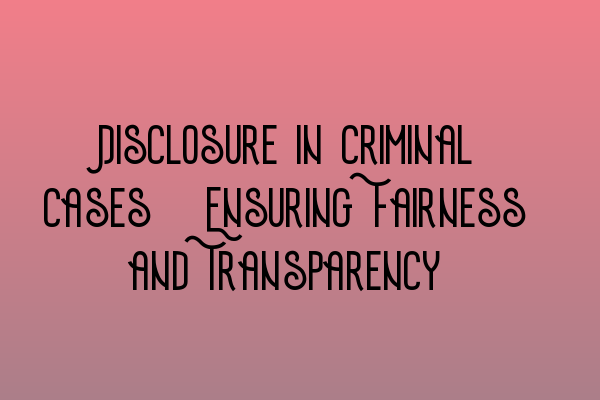Disclosure in Criminal Cases: Ensuring Fairness and Transparency
In criminal cases, the principle of disclosure plays a fundamental role in ensuring fairness and transparency within the criminal justice system. Disclosure refers to the process by which the prosecution shares relevant evidence with the defense. Proper disclosure is crucial to enable the defense to adequately prepare their case and to ensure a fair trial.
The principles of disclosure are rooted in the right to a fair trial, as guaranteed by Article 6 of the European Convention on Human Rights. This right encompasses the right to know the case against you and to have access to the evidence in order to challenge it effectively. Failing to disclose material that is relevant to the defense can undermine the fairness of the trial and potentially lead to wrongful convictions.
In recent years, there have been concerns about disclosure failures in criminal cases. These failures can have serious consequences, not only for the individuals involved but also for public confidence in the criminal justice system. High-profile cases, such as the collapse of several rape trials due to disclosure issues, have highlighted the importance of addressing these concerns and implementing effective measures to ensure proper disclosure.
One of the key challenges in disclosure is the sheer volume of digital evidence that is now available in criminal investigations. This includes CCTV footage, phone records, social media posts, and other electronic data. The significant increase in digital evidence has made the disclosure process more complex and time-consuming. It is essential for law enforcement agencies and prosecutors to have effective systems in place to handle and disclose digital evidence promptly and efficiently.
To address the challenges of disclosure in the digital age, the Criminal Procedure Rules were amended in 2018 to incorporate new provisions specifically dealing with digital disclosure. These amendments aim to ensure that both the prosecution and the defense are aware of and have access to all relevant electronic evidence. The amendments require the prosecution to make reasonable efforts to search for and disclose digital material that may assist the defense. It is, therefore, crucial for criminal lawyers to be proficient in handling digital evidence to ensure they can effectively challenge the prosecution’s case.
In addition to handling digital evidence, adequate training and resources for prosecutors, police officers, and defense lawyers are also essential for achieving effective disclosure. The Solicitors Qualifying Examination (SQE) now serves as the qualifying examination for solicitors in England and Wales. Thus, it is imperative for aspiring solicitors and legal professionals to have a comprehensive understanding of the disclosure process and its importance in upholding justice.
For those looking to prepare for the SQE, SQE 1 preparation courses are available to help candidates familiarize themselves with the exam format and content. These courses provide invaluable resources and practice materials, such as SQE 1 practice exam questions, to assist candidates in building competence in criminal law and procedure.
Furthermore, to enhance practical skills and knowledge, SQE 2 preparation courses offer comprehensive training in the practical aspects of criminal law and practice. These courses equip future solicitors with the necessary skills to handle complex legal issues, including the challenges associated with disclosure in criminal cases.
As the SQE becomes the standard route for qualification, aspiring solicitors must stay updated on important dates and exam schedules. The SRA SQE Exam Dates provide a reliable source of information regarding upcoming SQE exams. Being aware of these dates allows candidates to plan their preparation effectively and ensure they are well-prepared for the exams.
In conclusion, disclosure in criminal cases is of paramount importance to ensure fairness and transparency in the criminal justice system. Effective disclosure enables the defense to adequately prepare their case and challenge the prosecution’s evidence. However, the increasing volume of digital evidence poses new challenges, making it crucial for legal professionals to be proficient in handling electronic evidence. Proper training, resources, and preparation are essential for aspiring solicitors to succeed in the SQE and to excel in criminal law and practice.
Related Articles:
SQE 1 Practice Exam Questions
SQE 1 Practice Mocks FLK1 FLK2
SQE 2 Preparation Courses
SQE 1 Preparation Courses
SRA SQE Exam Dates
